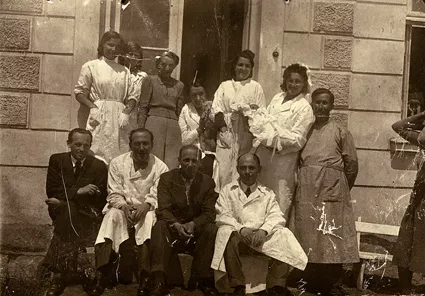This photo was taken during the Soviet occupation of Lwow.
I studied in the Lwow Technical University , and I needed money.
The brother of my stepmother Lusia was a doctor, a director of hospital, and he employed me as a secretary.
Between 1939 and 1940 we were under the Soviets. And that wasn't normal.
My father lost his job, my uncle, Aunt Mia's husband, was arrested.
My second uncle, Ada's father, Aunt Regina's husband, also died in the Brygidki prison.
When the Germans came, my mother's brother, Uncle Bernard, fled from Katowice to Lwow and lived somewhere in Lwow.
They were taken to the forest and murdered. My stepmother's brother, a doctor, was also taken away, never heard of again.
My father spent a number of nights in the coal box, hiding from deportation, because during the Soviet era lights were put out in the whole city and they went from house to house, taking men, deporting them to Siberia or taking to the forest.
When my father lost his job there was no money, I lived for some time with Aunt Mia, in a terribly cramped apartment, it was after the Soviets had taken their husband, it may have been 1940 or 1941.
Aunt Mia's husband was incarcerated in Lwow's harshest prison, the Brygidki, spent six months with his legs in water all the time.
I don't know whether such were the conditions or it was a punishment.
They were quite rich because they had a factory, and Aunt Mia had that beautiful black pearl, she sold it and ransomed my uncle from the NKVD.
Uncle could no longer walk, his legs were very thick, and they lived in terrible conditions because she had sold everything to buy him out. Uncle lay on the bed all the time and he sewed some cyanide into his clothes because he thought the Soviets could come for him again.
He was a bourgeois, after all. My Aunt took that cyanide away from him, and when the Germans came, he was taken to the Janowski camp and shot at the very first roll call because he couldn't stand.
My Aunt went to the ghetto, lived in the same house as Samek with Romek and his wife, because they had come to Lwow when the Germans came. Romek may have been 5 or 6 when he was in the ghetto.
At first we terribly feared the Soviets because when the Soviets marched into Lwow, in 1939, I lived opposite the technical university.
There's a large garden in front of it, a board fence, and that's where the Polish military surrendered their arms.
The Soviets arrived riding bareback. Savages! Without uniforms, with just some red rags stuck here and there.
Their hair uncut, in those felt hats that are a hotbed for lice.
The female soldiers were also terribly louse-infested. And they bought nightgowns as ball gowns.
They commandeered our apartment and a postmaster from Odessa, now appointed the postmaster of Lwow, moved in with us with his wife.
The first day he stood by the bathroom light switch and toggled it on and off, because he didn't know how it works, back in their place they had those turning knobs.
Later, when he got to know us, he pushed us to attend the 1st May parade and we had to go.
I always said, 'And why don't you go?' 'I went for forty years, now it's your turn.'
I went for the parade with the rest of my school because they wrote down who went and who didn't and we were all afraid, they'd arrest you and deport you, so you went.






































